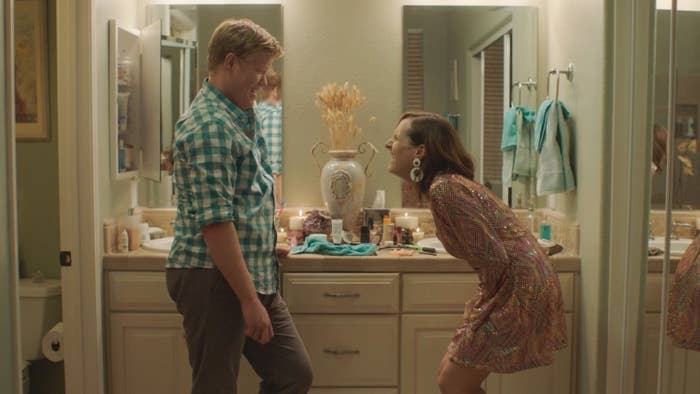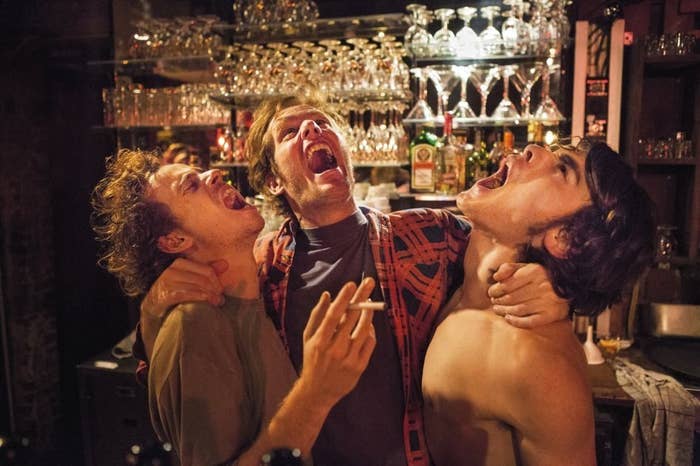
Other People, one of this year's Sundance Film Festival opening-night movies, is exactly what the fest has become famous and infamous for: the quirky indie dramedy.
It's the kind of film — a laugh-through-the-tears cancer saga — that split the theater between sobbing and wincing. It's the kind of film that's a mix of the sweet and the mildly edgy, the sincere and the manipulative, featuring a nice lineup of actors getting out of their comfort zone. It's the kind of film that opens on a family sobbing by a deathbed before they're interrupted by an answering machine message from a friend checking in while ordering at a fast-food drive-thru. It's the kind of film that distribution companies have, in the past, gotten into altitude-giddy bidding wars over.
When it ended, I was left wondering whether this genre has stuck because life really feels like the stuff of a quirky indie dramedy, or is "quirky indie dramedy" a gloss that can be applied to anything, like an Instagram filter?
Other People is the directorial debut of Saturday Night Live and Broad City's Chris Kelly. It's a semi-autobiographical story about a 29-year-old comedy writer named David (Jesse Plemons) who leaves New York to move home to spend time with his cancer-stricken mother, Joanne (Molly Shannon). He hates Sacramento and has a strained relationship with his dad (Bradley Whitford), who's still uncomfortable having a gay son.
The pilot that David's been working on didn't get picked up, and he recently broke up with Paul, his boyfriend of five years (Zach Woods), so in addition to being devastated by the maternal illness that comes to encompass his year, he's adrift and in retreat from his life in New York. It's like half a dozen past Sundance movies smashed together, except that it's also clearly inspired by personal experience.
And, curiously, it's the real pain underlying Other People that trips it up, because Kelly doesn't have the distance from this material to adequately separate David's growing self-pity and resentment from the movie's own point of view. The perils of a story like this — and it's one last year's Sundance cancer dramas James White and Me & Earl & the Dying Girl (in which Shannon also acted) avoided — is that it risks turning a death into someone else's life lesson. And while Plemons, Dillon High's most wonderfully unexpected breakout, is good as David, and Shannon is even better as a woman for whom dying has offered a degree of liberation, Other People can't see her or the other characters beyond how they affect David.
Even when the movie acknowledges that David is being a jerk — like when he blows off his younger sisters (Maude Apatow and Madisen Beaty), to whom he has trouble relating, or drunkenly tries to get a date to agree with him about how awful Sacramento is — it basically agrees with him. His siblings are undifferentiated and a little abstract, and his hometown is a contemptuously portrayed purgatory of Applebee's and Redbox rentals, one lousy gay bar and Train's "Drops of Jupiter" as the omnipresent soundtrack, a running joke.
It's telling that the movie's strongest moments are the ones that feel less like they were directly lifted from emotionally raw recent history, the ones that get outside David's head a little — like the scene in which he and Paul have poignantly awkward sex as a coda to their relationship, two characters who still care about each other but who are in the midst of conscious uncoupling. It's a sequence that feels like it involves two whole people, not just a protagonist and foils for his pain.

Belgica, the new film from Belgian director Felix van Groeningen, is also rooted in personal history — it kicks off with a winking title card noting that everyone in the movie that follows, even the ones based on real people, is fictional. And it also follows an arc that feels familiar from the start, though with a Euro bent. Van Groeningen, whose last film was the writ-large love story The Broken Circle Breakdown, has a messy, music-driven sensibility that powers his work through plots that skew toward melodrama.
This one is about two grown brothers who start a bar together — or rather the older, Frank (Tom Vermeir), who's married with a toddler, arrives on Jo's (Stef Aerts) doorstep and announces he's going to help him run the café he's just purchased. The hope and wariness with which Jo greets Frank tells us everything we need to know about the dynamic between the two, even before they go into business together. Frank's the bold one, better at big ideas than follow-through, ready to take a punch for his more vulnerable brother, but less likely to set his own bad habits aside.
Things fall apart, obviously. But for a while, Belgica exists as an ode to reckless punk rock idealism, as Frank and Jo build out a new room with a stage and fill it with bouncing crowds and an array of acts, from a rockabilly group to a marching band. (The soundtrack is otherwise composed by Soulwax.) They hire their friends and have a dinner in the bar's half-constructed hall, vowing that their venue will be like Noah's ark, a place in the storm where everyone's welcome. It's such a nice idea, that this party that could go on forever — and the concert scenes are so smash-a-bottle-and-embrace-a-stranger joyous, often spotlit in the crowded dark, that it aches a little bit when reality starts creeping in, in the form of fire inspectors, the need for security, and Frank's hard partying.
True stories are valuable, but there's something to be said for the warm escape of fiction, especially in the context of what's become a familiar formula.

